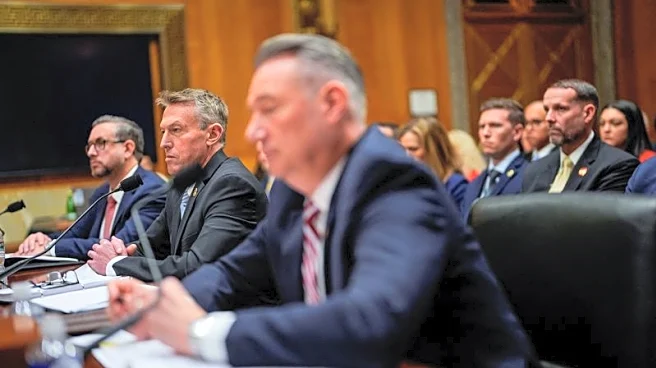What's Happening?
Egyptian mediators have proposed a deal to resolve tensions in the Rafah area of Gaza, where Hamas operatives are reportedly holed up. The proposal suggests that these operatives surrender their arms to Egypt and
provide details of tunnels in exchange for safe passage to other areas of the enclave. This initiative aims to address the risk posed to the U.S.-brokered ceasefire that took effect on October 10. The Rafah area has witnessed attacks on Israeli forces, which Israel attributes to Hamas, though the group denies involvement. The ceasefire is part of President Trump's plan to end the Gaza conflict. Talks are ongoing, but neither Israel nor Hamas has accepted the proposal yet.
Why It's Important?
The proposal is significant as it seeks to stabilize the fragile ceasefire in Gaza, which is crucial for regional peace. The ceasefire is a key component of President Trump's broader strategy to end the Gaza war, which includes disarming Hamas and establishing a technocratic Palestinian governance with international oversight. The successful implementation of this proposal could prevent further violence and loss of life, benefiting both Israeli and Palestinian civilians. However, the reluctance of both parties to accept the deal highlights the complexities involved in achieving lasting peace in the region.
What's Next?
If the proposal is accepted, it could lead to a reduction in hostilities and pave the way for further negotiations on the next phases of President Trump's plan. This includes the disarmament of Hamas and the establishment of a new governance structure in Gaza. The international community, particularly the U.S. and Egypt, may play a crucial role in facilitating these discussions and ensuring compliance with the ceasefire terms. The outcome of these negotiations will significantly impact the geopolitical landscape of the Middle East.
Beyond the Headlines
The proposal also raises questions about the long-term governance of Gaza and the role of international forces in maintaining peace. The involvement of Egyptian mediators underscores Egypt's strategic interest in regional stability and its influence in Palestinian affairs. Additionally, the humanitarian situation in Gaza remains dire, with ongoing challenges in accessing basic services and rebuilding infrastructure. The success of the ceasefire and subsequent agreements could improve living conditions for Gazans and foster economic development.











